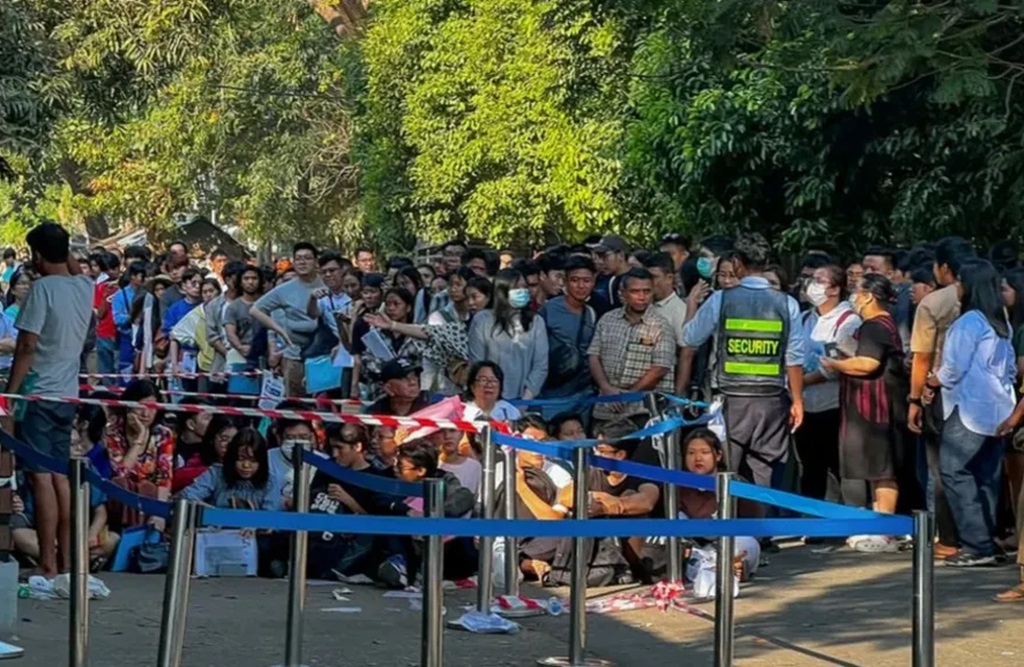Myanmar’s military government has banned conscription-age men from leaving the nation for jobs, weeks after an enlistment order caused many to escape. Authorities announced on Thursday that they will suspend all applications from men for international work permits.
There is a sizable Myanmar diaspora working in other Asian countries, and people were previously allowed to travel for work overseas.
However, the limits come as the junta faces rising opposition in the country’s ongoing civil conflict. The junta issued the conscription order in February, after months of losses.
In the three months that followed, about 100,000 males requested for work visas, as part of a larger exodus. Young people had previously told the BBC that they were desperate to leave the nation. Men must enlist between the ages of 18 and 35, and women between the ages of 18 and 27.
The crackdown on work abroad is now being viewed as yet another huge setback. Many Myanmar citizens had gone to work in Thailand, Malaysia, Singapore, South Korea, and the United Arab Emirates.
A 32-year-old man who was leaving the nation for Japan expressed his dismay. He told BBC News that “[everyone] has lost their hope for the future.”
“There are no work opportunities in the country, and they have also prevented us from leaving. Are we not allowed to do anything? He said.
Ko Phyo, a 28-year-old from Lewey Township in the capital Naypyidaw, told the BBC that the military council’s decree left the country’s youth with no job possibilities.
Young Men Fleeing Myanmar
The BBC has seen tens of thousands of young Myanmar citizens flee the nation since the February edict, with many seeking refuge in the Thai border town of Mae Sot. The majority of the recent entrants have been young men fleeing national conscription.
Since the military deposed Aung San Suu Kyi’s democratically elected government in a 2021 coup, the junta has faced an uprising from a variety of organizations, which has evolved into a full-fledged civil war.
According to the UN, the violence has already killed thousands and displaced at least 2.6 million people.
Meanwhile, rebel fighters in Myanmar have reportedly begun to reinforce their defenses against the Myanmar army by establishing patrols just across the border in Mae Hong Song province.
High-level Karenni Army (KA) sources notified Thai authorities on Saturday that the army is currently conducting patrols in regions surrounding Tambon Mok Champae in the northern province, following the seizing of Myanmar military installations in Chador and the evacuation of junta troops.
According to accounts, the KA and Karenni Nationalities Defence Force have taken over more than ten camps. These places are located directly across the Thai border towns.
The KA and KNDF have established patrol teams to formalize their grip over the Chador region, with a total of 220 troops now involved in border operations. Plans are also underway to appoint 12 members of the force to serve as forestry officers.
Myanmar Military Losing Ground
The Myanmar junta is under pressure on numerous fronts, but recent successes by various armed factions are viewed as major threats to the administration that deposed the elected government in 2021.
These successes included capturing large land in Myawaddy, Tak province, across from Mae Sot. The military has been steadily moving from the west in an attempt to mount a counteroffensive, and there have been reports of losses.
The junta recently declared the suspension of licenses for men to work abroad, following the implementation of a military conscription legislation, which caused thousands to flee the country.
In February, facing considerable violent opposition, the junta announced that it would implement a rule requiring all men to serve in the military for at least two years.
According to media sources, this caused long lines for visas at foreign embassies in Yangon, with many fleeing to neighboring Thailand to avoid the ban. Analysts believe the move will also have a negative influence on Thailand’s labor market.
The war is also affecting cross-border trade. According to the Federation of Thai Industries (FTI), instability could affect the value of border trade between Thailand and Myanmar by 40%.






